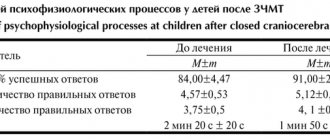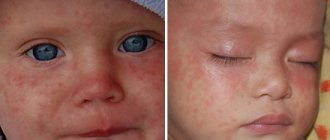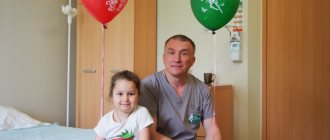According to statistics, 1 baby out of 10 is born ahead of schedule. Such children are classified as premature. They require special attention, because they are prone to lagging behind in physical and mental development. It is not surprising that every parent is overcome by anxiety if the child is born before 37 weeks. Let's figure out how such children differ from others, and how the first year of their life goes.
What kind of babies are called “premature”
Normal pregnancy lasts from 37 to 42 weeks. If labor begins earlier, the baby is born premature. Its weight usually does not exceed 2.5 kg. Doctors distinguish 4 degrees of a child’s condition, depending on 3 factors:
| Degree | Duration (weeks) | Weight, kg) | Height (cm) |
| First | 35 — 37 | 2 — 2,5 | 40 — 47 |
| Second | 33 — 35 | 1,5 — 2 | 37 — 40 |
| Third | 31 — 33 | 1 — 1,5 | 35 — 37 |
| Fourth | 29 — 31 | < 1 | < 35 |
If the child weighs at least 1.5 kg, medical professionals indicate low body weight (LBW) in the documents. Children from 1 to 1.5 kg are classified as very low body weight (VLBW), and babies lighter than 1 kg are classified as extremely low birth weight (ELBW). On the 8th day of life, a premature baby is called a newborn.
When the birth occurred and what weight the baby was born with are not the only factors by which doctors assess his condition and make predictions. Also of great importance are: the presence of congenital pathologies in the child, chronic diseases in the mother, and her age. As a result, the degree of maturity of the baby is determined, according to which medical procedures are prescribed and recommendations for care are given. In the first minutes after birth, a premature baby must be checked:
- severity of basic reflexes;
- state of muscle tone;
- level of motor activity;
- thermoregulation.
Doctors suck out mucus from the baby's mouth and sometimes from the stomach. The child's lungs and ability to breathe independently are assessed. For children weighing less than 1 kg, conditions are usually created as close as possible to those in the womb. They need artificial ventilation. Thanks to the achievements of modern medicine, it is possible to put even the smallest with a body weight of 500 g on their feet. The main thing is not to give up and provide the baby with quality care and continuous medical supervision. With the right approach, premature babies very quickly catch up with their peers and are no different from them with age.
Premature babies: consequences
However, it is not at all necessary that all the difficulties listed above will affect the child. In addition, competent medical supervision and parental care work wonders. Many cope with all difficulties and continue to live fully.
Prematurity is not always a story of illness and weakness. Thus, it is known that such celebrities as the artist Leonardo da Vinci, the emperor and commander Napoleon Bonaparte, the scientist Albert Einstein and one of the founders of classical physics Isaac Newton were born prematurely.
What do babies born at 24-28 weeks look like?
In approximately 40 weeks, a child turns from an embryo into a full-fledged person. During this period, the development of all vital systems in his body occurs. If a baby is born ahead of schedule, he does not have time to fully form and prepare for life outside the mother’s womb. Premature babies are all different. Their differences mainly depend on the period at which the birth occurred.
For babies born at 24–28 weeks, the following signs are characteristic:
- weight up to 1 kg;
- a skull of a non-standard shape - an elongated back of the head, a high forehead, a thin neck, the head is visually much larger than the chest;
- the shells of the ears are very soft with underdeveloped cartilages;
- the upper and lower limbs are very thin, and the elbows and knees are noticeably sharp;
- nails are below the edge of the fingers;
- the navel is not in the center of the abdomen, but below;
- there is a clear underdevelopment of the genital organs - in girls the small lips remain visible, in boys the testicles have not yet descended;
- the skin is red, thin and wrinkled;
- the vascular network is clearly visible;
- muscles are in weak tone;
- the eyes remain closed for the first few weeks.
The first stage of nursing is pediatric intensive care
In the case of significant immaturity of the vital systems of the newborn (for example, if a premature baby is not able to breathe on his own), he is admitted to the pediatric intensive care unit immediately after birth. Here the babies lie in special incubators, covered with transparent caps with four holes - two on each side (for therapeutic manipulations). All incubators are equipped with artificial lung ventilation devices. Children who have no or weakly expressed sucking reflex receive food for the first few weeks (optimally warmed breast milk, sometimes with specially selected additives) through a nasogastric tube. A constant temperature is maintained in the incubator (after all, the danger is not only hypothermia, but also overheating) and air humidity (about 60%) so that the baby’s mucous membranes do not dry out. Sometimes incubators are equipped with water mattresses, which bring the conditions closer to being in amniotic fluid. Through numerous tubes and wires, the child is connected to monitors, IVs and other machines that monitor his pulse, temperature and breathing, conduct regular blood tests, administer necessary medications and perform many other important functions. If the indicators recorded by these devices deviate dangerously from the norm, an alarm sounds. Resuscitation procedures are not limited to artificial ventilation and feeding through a feeding tube. Children born prematurely are at risk of developing various complications, most of which can be prevented or treated with modern developments in neonatal resuscitation. Let's give just one example. In the lungs, as is known, the most important process for human life occurs - gas exchange: oxygen from the air passes into the blood, and carbon dioxide from the blood into the air. Tiny bubbles braided by a network of capillaries - alveoli - are responsible for this. So, a substance that counteracts the collapse of the alveoli in the lungs during exhalation, the so-called surfactant, is formed only at 22-24 weeks of pregnancy, and very premature babies need the introduction of an artificially synthesized surfactant. There are many such examples, but a detailed description of all the procedures carried out with premature babies in the intensive care unit will take up too much space and is unlikely to be understandable and interesting to people who are far from medicine.
External signs of babies born at 28–32 weeks of pregnancy
In such premature babies, the signs are not as pronounced as in those born earlier. However, they are often placed in special incubators. Their head circumference is on average 3 cm larger than the sternum. Large springs and open seams are noted on the head. They are also weakened, most of their organs have not gone through all stages of development. There is a barely noticeable layer of fat on the body, and the whole body is covered with light fluff. Their weight usually does not exceed 1.5 kg. Such children have a great chance of quickly catching up with their peers in development.
How to catch up with peers?
This question worries any mother very much, but there is no need to worry too much: in the first year of life, the baby’s body is able to recover in record time. Of course, the child cannot do without your help, and one of the best methods is massage. It can be started when the baby’s weight reaches 2500 g: first simple stroking, then more intense movements. Be sure to consult with your pediatrician - he will show you special massage techniques.
Skills Comparison Chart
Sometimes experts also recommend infant swimming, water gymnastics and physiotherapy, but these procedures can only be carried out after consultation with a doctor. Of course, every mother wants her baby to develop “according to the books,” but, first of all, he needs time and your care. You'll see: by the age of two, your child will certainly catch up with his peers, and there will be no trace left of the difficult start.
What are the distinctive features of children born at 32–37 weeks?
Despite premature birth, these premature babies are more similar than other newborns. They have no fuzz on their face and body; they already have a formed subcutaneous fat layer. Their nipples are already forming, the navel is located where it is needed. Body weight varies from 1.5 to 2.5 kg. Complications rarely occur in such babies, but they still require special care and constant monitoring by a pediatrician.
In some cases, premature babies remain in the maternity hospital for up to 4 months. This depends on the degree of prematurity and the severity of certain developmental problems. If doctors insist on additional monitoring, this should not be neglected.
Advice for parents of a premature baby
- Your child is still a little different from everyone else, but over time and with your help, he will be able to catch up with his peers in his development.
- Fight for breastfeeding, it is very important for such babies
- Particular attention is paid to nutrition; such children eat more slowly and usually in smaller portions, but somewhat more often than full-term children. The interval between feedings should not exceed 4 hours.
- Premature babies are easily susceptible to infections, so you should carefully monitor the cleanliness of the room and limit the number of people who want to visit the baby at first.
- At first, doctors do not recommend putting such weakened babies to sleep on their tummy; it is better to place the child on his back.
- When swimming, the water temperature should be at least 37°C
- In the room where the premature baby is located, the temperature should be about 23-25°C. — Sterilization of bottles and nipples is mandatory for such children; try to follow this rule, especially in the first months of the baby’s life.
- Premature babies benefit greatly from a special massage that can be performed by an experienced specialist. After consultation, parents can perform simple massage techniques on their own.
- Complementary foods and vaccinations are prescribed strictly on the doctor’s recommendation, after assessing the baby’s condition.
- Be sure to follow all the doctor’s recommendations; if necessary, immediately call a doctor at home or an ambulance.
Correspondence between weight and height (table)
The shorter the gestational age at which the birth occurred, the lower the baby’s performance. Typically, height and body weight are noted within the following limits:
| Gestation period (weeks) | Weight, kg) | Height (cm) |
| 24-28 | 0,85 — 1,3 | < 35 |
| 29 | 1,15 — 1,5 | 35 — 36 |
| 30 | 1,25 — 1,7 | 35 — 37 |
| 31 | 1,3 — 1,75 | 36 — 37 |
| 32 | 1,4 — 1,95 | 36 — 38 |
| 33 | 1,55 — 2,3 | 36 — 39 |
| 34 | 1,8 — 2,5 | 37 — 40 |
| 35–36 | 1,95 — 2,5 | 40 — 47 |
All babies born at 27–34 weeks have an underdeveloped pulmonary system and therefore need to be connected to a ventilator. They cannot breathe on their own for several months. Feeding also occurs through a tube during this entire period, as there is immaturity of the gastrointestinal tract. The rate of weight gain is very low. Due to the underdevelopment of various body systems in the first months of life, the child does not gain weight well, but by 3–4 months, vital processes stabilize.
Weight gain and growth changes in premature infants in the first year of life
| Age | 4th degree | 3rd degree | 2nd degree | 1st degree | ||||
| Weight, kg) | Height (cm) | Weight, kg) | Height (cm) | Weight, kg) | Height (cm) | Weight, kg) | Height (cm) | |
| 1 month | 0,18 | 3,9 | 0,19 | 3,7 | 0,19 | 3,8 | 0,3 | 3,7 |
| 2 months | 0,4 | 3,5 | 0,65 | 4 | 0,75 | 3,9 | 0,3 | 3,6 |
| 3 months | 0,65 | 2,5 | 0,65 | 4,2 | 0,75 | 3,6 | 0,8 | 3,6 |
| 4 months | 0,6 | 3,5 | 0,65 | 3,7 | 0,75 | 3,8 | 0,75 | 3,3 |
| 5 months | 0,65 | 3,7 | 0,75 | 3,6 | 0,8 | 3,3 | 0,8 | 2,3 |
| 6 months | 0,75 | 3,7 | 0,8 | 2,8 | 0,7 | 2,3 | 0,7 | 2 |
| 7 months | 0,5 | 2,5 | 0,95 | 3 | 0,6 | 2,3 | 0,7 | 1,6 |
| 8 months | 0,5 | 2,5 | 0,6 | 1,6 | 0,7 | 1,8 | 0,7 | 1,5 |
| 9 months | 0,5 | 1,5 | 0,6 | 1,6 | 0,7 | 1,8 | 0,7 | 1,5 |
| 10 months | 0,45 | 2,5 | 0,5 | 1,7 | 0,4 | 0,8 | 0,4 | 1,5 |
| 11 months | 0,5 | 2,2 | 0,3 | 0,6 | 0,5 | 0,9 | 0,4 | 1 |
| 12 months | 0,45 | 1,7 | 0,35 | 1,2 | 0,4 | 1,5 | 0,3 | 1,2 |
| 1 year (total) | 7,08 | 68-70 | 8,45 | 69-72 | 8,65 | 70-73 | 9,45 | 71-74 |
Average body weight of premature babies in the first year of life
The table below shows approximate values that were determined statistically. Each child is individual and you need to focus primarily on the pediatrician’s recommendations.
| Age | 4th degree | 3rd degree | 2nd degree | 1st degree |
| Starting weight | 0.5–1 kg | 1 — 1,5 | 1,5 — 2 | 2 — 2,5 |
| 1 month | 0,68 — 1,18 | 1,19 — 1,69 | 1,69 — 2,19 | 2,3 — 2,8 |
| 2 months | 1,08 — 1,58 | 1,84 — 2,34 | 2,44 — 2,94 | 2,6 — 3,1 |
| 3 months | 1,68 — 2,26 | 2,59–3,09 | 3,19 — 3,69 | 3,4 — 3,9 |
| 4 months | 2,3 — 2,9 | 3,34 — 3,84 | 3,94 — 4,44 | 4,15 — 4,65 |
| 5 months | 2,95 — 3,55 | 4,09 — 4,59 | 4,74 — 5,24 | 4,95 — 5,4 |
| 6 months | 3,7 — 4,3 | 4,89 — 5,39 | 5,44 — 5,94 | 5,65 — 6,1 |
| 7 months | 4,2 — 4,8 | 5,84 — 6,34 | 6,04 — 6,54 | 6,35 — 6,8 |
| 8 months | 4,7 — 5,3 | 6,44 — 6,94 | 6,74 — 7,24 | 7,05 — 7,5 |
| 9 months | 5,2 — 5,8 | 7,04 — 7,54 | 7,44 — 7,94 | 7,75 — 8,2 |
| 10 months | 5,65 — 6,25 | 7,54 — 8,04 | 7,84 — 8,34 | 8,15 — 8,6 |
| 11 months | 6,15 — 6,75 | 7,84–8,34 | 8,34 — 8,84 | 8,55 — 9 |
| 1 year | 6,6 — 7,2 | 8,19 — 8,69 | 8,74 — 9,24 | 8,85 — 9,3 |
Here we are at home!
The baby will be discharged from the hospital as soon as he no longer needs constant medical supervision. Several more conditions must be met: stable weight gain, normal thermoregulation (the baby must maintain temperature without additional heating for 24 to 48 hours), the ability to feed independently (breast milk or formula). And most importantly, you must be able to care for your baby without outside help.
Here are some general tips to help during your first weeks at home.
- Remember the peculiarities of thermoregulation of premature babies. The room should not be too hot or too cold. The optimal temperature is 24 – 26 degrees. The room needs to be ventilated regularly; a humidifier won’t hurt either;
- Try to create soft lighting in your baby’s room and avoid harsh noise, because his nervous system has not yet matured;
- At first, you should not invite guests: for the baby this is additional stress and a potential source of infection;
- When bathing, you need to take into account the degree of prematurity: with moderate prematurity, you can wash the baby in the bath from the 7th to 10th day of life, with deep prematurity - from the 3rd to 4th week. To avoid drying out your baby’s thin skin, use special moisturizers and avoid soap;
- It is better to plan walks with a premature baby a week or two after discharge. If it’s not very cold outside, start with 10–15 minutes, gradually increasing the duration of “exercise” to an hour and a half a day.
Features of the development of a premature baby
Children born prematurely always lag behind their peers born on term. According to statistics, this situation occurs for no more than 6 months. After this time, previously weakened children quickly catch up with other children. Parents of premature babies often face problems with the development of their nervous system. Due to her instability, signs of hyperactivity often appear.
1 month
Almost all premature babies are under the supervision of neonatologists in the first month of their life. If the baby is born very small and weak, he may be in the hospital for several months. At the same time, it is placed in a special open or closed incubator. The latter is necessary in order to create comfortable conditions for the baby and enable all body systems to develop properly.
If a child has problems with thermoregulation and needs special therapy, he is placed in a closed incubator. After the baby’s condition has stabilized, he is transferred to an open structure. The next stage is a specialized department in which children with already developed basic skills (breathing, nutrition) are located. There they are observed until discharge.
In the first month of life, weight gain is minimal. The culprit is a poorly developed sucking reflex and underdeveloped body systems. To increase the amount of calories supplied, feeding is done through a tube. The ideal food for premature babies is breast milk. During this period of life, the baby’s body is greatly weakened, so it is important to maintain sterility conditions and protect him from various infections. Contact with large numbers of people is unacceptable. The usual behavior for such a child is to sleep a lot and be inactive. His muscles are still very weak, so pronounced signs of hypotonicity are recorded.
2 months
Children with 1–2 degrees of prematurity are discharged home in the second month of life. Their sucking reflex is still poorly developed, so they need to feed not only from the breast, but also from a bottle with previously expressed breast milk. Doctors recommend paying attention to simple physical exercises - placing the baby on his stomach as often as possible. Despite the fact that the baby gets tired quickly, his muscle tone will gradually increase. A significant increase in motor activity is usually observed from 1.5 months. A characteristic feature of premature babies is the hand clenched tightly into a fist. Fingers need to be developed with a special massage.
If a child has 3-4 degrees of prematurity, he also spends the second month of life in the hospital. Only after gaining weight to 2.3 kg and complete normalization of his condition will he be discharged home. For very premature babies, constant and close contact with the mother is important. Even if there is a feeling that he does not respond to touch, the child is simply still weak, and therefore cannot show emotions properly.
3 months
By three months, premature babies are much like other newborns. They are actively developing, their reflexes are improving:
- the child’s weight and height are rapidly increasing;
- the gaze is already focused on objects, the child studies the world around him with interest;
- as muscle tone increases, the baby can hold various objects in his hands;
- the first attempts to raise and hold the head appear.
Pediatricians recommend signing up for a professional massage to stimulate muscle development. Sleeping on your stomach is not yet recommended at this age. It is better to place the child on his back and alternately turn his head left and right.
4 months
Even very premature babies are usually discharged home by 4 months. Their weight reaches 2.3–2.9 kg, they independently hold their heads and make various sounds. During this period, all neuropsychic processes in the child are stabilized. It is important to spend a lot of time outdoors. But you should be careful when choosing clothes. Both hypothermia and overheating should be avoided.
5 months
By 5 months after birth, a premature baby noticeably catches up with its peers. He smiles consciously, reacts to sounds and turns his head in search of their source. He can easily hold light objects and shake rattles. Contact with adults evokes clear positive emotions in him. By 5.5–6 months, many babies born prematurely begin to roll over from their back to their stomach.
6 months
Six months after birth, the weight of a premature baby should triple. The baby masters turning over from his stomach to his back and studies his surroundings with even greater interest. He willingly makes contact with adults, plays and “talks.” The differences between him and his peers are practically erased. At 6 months, complementary foods are usually introduced, but only after agreement with the pediatrician. He must assess the child’s condition and the characteristics of his development. The behavior of children with 1–2 degrees of prematurity is almost identical to those born with 3–4 degrees.
7 months
By 34–38 weeks, babies begin to develop their first teeth. They have a desire to eat on their own. They learn to crawl and become very active and inquisitive. In children with 3–4 degrees of prematurity, motor activity is not yet fully developed, but deviations, if any, are barely noticeable.
8 months
Children with any degree of prematurity try to sit up by 8 months. Only the weakest may not be able to do this, but very soon they too will master this skill. It is still difficult for them to hold their back on their own, so it usually arches. The child is trying to crawl “on his belly”, briskly moving around the room. Some even get down on all fours. The baby begins to understand speech. He easily perceives simple sentences - if you ask him to show something, he will certainly point his finger at this object or at least pay attention to it.
9 months
You can try to find differences between a premature 9-month-old baby and one born on time - but this is unlikely to succeed. At this age, children confidently crawl on all fours, sit, and some even try to stand on their feet while holding onto something. The amount of sleep decreases noticeably. Most children begin to pronounce the first syllables and show even greater interest in the world around them.
10 months
The baby clearly understands speech and tries to answer. Always reacts when addressed by name. His muscles are already strong enough, so he stands confidently, holding on to the support. The possibilities for gaming activities are significantly expanded. The child is interested in a large number of household objects, involves adults in games, and smiles often.
11–12 months
In physical terms, premature babies closer to 1 year are no longer at all different from their peers. They take their first steps, show great interest in interactive toys, pronounce simple words, and are interested in regular food.
Development of skills depending on the degree of prematurity
| Skill | 4th degree | 3rd degree | 2nd degree | 1st degree |
| Fixation of gaze on objects | 2–3 months | 2 — 2,5 | 1,5 — 2 | 1 — 1,5 |
| Head hold | 3–4 | 3 — 4 | 2 | 1,5 — 2 |
| Turn onto your stomach from your back | 6,5 — 7,5 | 6 — 7 | 5 — 6 | 5 — 5,5 |
| Turn from stomach to back | 7,5 — 8,5 | 7 — 8 | 6 — 7 | 6 — 7 |
| Sit | 9 — 12 | 8 — 10 | 7 — 8 | 6 — 7 |
| Stand | 11 — 12 | 11 — 12 | 9 — 10 | 9 |
| Walk | 14 — 15 | 14 -15 | 11 — 13 | 11 — 12 |
| Speak | 12 — 14 | 12 | 11 — 12 | 11 -12 |
Psychological aspect
If your baby was born prematurely, you probably spend hours searching for information about how he will develop and how to help him. But try to stop for a second and think about your own mood and well-being. Most “hurried” mothers experience a huge feeling of guilt in front of their child, lack of self-confidence, and dissatisfaction with their body. Be sure to talk about your condition with your loved ones, because they are also scared and confused. Don’t be shy about asking your family for help, delegate as many household chores to them as possible, and get plenty of rest. If the baby is still in the hospital, gradually prepare a dowry for him and arrange a nursery: this will lift your spirits and give you confidence that you will soon be reunited with your little fighter.
The nuances of feeding premature babies
The type of complementary feeding depends primarily on the gestational age at which the premature baby was born:
- with 1 degree of prematurity, breastfeeding is provided from the first days of life;
- at grade 2 - expressed breast milk through a bottle;
- at grades 3–4 - through a special probe.
The doctor makes a verdict in the first hours of the baby’s life, assessing his condition, sucking reflex, and the development of key body systems. Breastfeeding should be continued for as long as possible. There is nothing more valuable and healthier than real breast milk. If very low weight gain is observed, the amount of food eaten is regulated. Upon discharge, the pediatrician gives recommendations on further nutrition.
The average daily food intake depends on the age of the premature baby. For example, from 10 days to 2 months it makes up ⅕ of the child’s weight. And at 8–12 months - 1/9 of body weight. When breastfeeding, it is impossible to calculate how much the baby eats, so you need to pay attention to his behavior. He will never eat more than he needs.
Together with mom
For a premature baby, the presence of the mother is especially important. Today, many hospitals are equipped with “mother and child” wards, where you can be with your child around the clock, care for him, feed him and support him during various procedures. If this is not possible, try to make the most of the permitted visiting hours: talk to the baby, pick him up (when the situation allows), sing songs. This will help the child recover faster.
The kangaroo method is considered very useful - skin-to-skin contact between the mother and the baby. To do this, a naked baby is placed on the mother’s chest, positioned on his tummy in the “frog” position. You can start with 20–40 minutes twice a day, gradually increasing the duration of the session to several hours. In this case, it is necessary to control the baby’s body temperature: to keep warm, you need to cover it with a blanket on top and put a hat on its head. It has been proven that the kangaroo method works wonders: the baby’s sleep and wakefulness phases are normalized, breathing and blood circulation improve. Proximity to the mother's breast contributes to the development of normal reflexes of the newborn: sucking, swallowing and searching.
Cardiovascular system of a premature baby
Like all other systems in the body of a premature baby, the cardiovascular system is imperfect. Thus, studies have shown that any irritation causes increased heart rate, increased sonority of heart sounds and increased blood pressure. Before birth, the fetus has its own specific circulatory system, but by the time of birth in full-term babies, all cardiac communications (transitions and connections between blood vessels and the heart, openings inside the heart) are correctly formed. Premature babies, due to the fact that they were born prematurely, may have various heart abnormalities
, which cause changes in cardiac parameters and worsen the general condition of the child. Echocardiography (ultrasound of the heart) is now widely used to diagnose cardiac abnormalities.
Since the cardiovascular system of premature babies reacts sensitively to external stimuli, you need to try to protect the baby from them (for example, from loud sounds).










